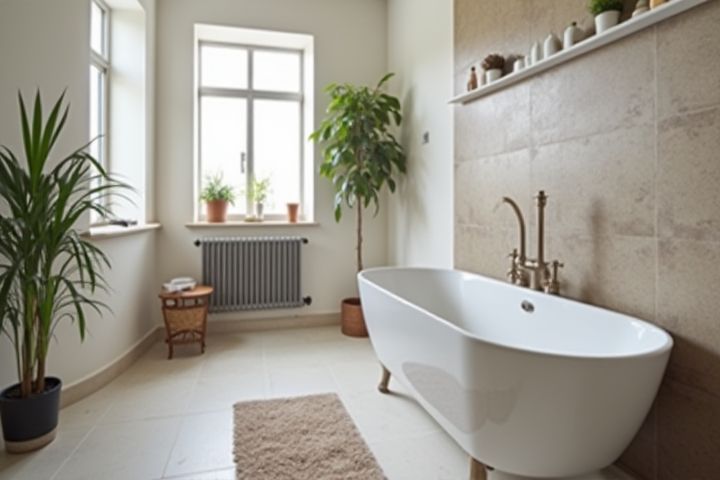
To estimate house renovation costs, start by assessing the scope of your project, including necessary repairs and desired upgrades. Research current material prices, labor costs, and any permits you may need, which will vary based on your location. Create a detailed budget that includes contingency funds for unexpected expenses, typically around 10-20% of the total project cost. Be sure to obtain multiple quotes from contractors to ensure you're getting competitive pricing. Finally, consider using renovation cost calculators or apps for a more precise estimate tailored to your specific plans.
How To Estimate House Renovation Costs
Assess the scope of work
To accurately estimate house renovation costs, begin by assessing the scope of work involved. Create a detailed list of all tasks, including structural repairs, electrical updates, plumbing alterations, and aesthetic improvements. Research local labor rates--averaging $50 to $150 per hour per tradesman--and material costs, which can vary widely, with averages ranging from $5 to $20 per square foot for flooring. A comprehensive plan, incorporating both labor and materials, ensures you capture the full scope of renovation expenses, allowing you to budget effectively.
Research local labor costs
To accurately estimate house renovation costs, start by researching local labor costs in your area, which can vary significantly based on location and demand. Online platforms and home improvement websites often provide average hourly rates for various trades, such as carpenters, electricians, and plumbers. Contacting local contractors for quotes can give you a more precise understanding of the going rates in your community. Remember to factor in any specific requirements for permits or inspections that may influence overall labor expenses associated with your renovation project.
Price materials accurately
Accurately estimating house renovation costs requires a detailed analysis of the materials needed for each project. Start by creating a comprehensive list of all materials, such as flooring, cabinetry, fixtures, and paint, along with their average prices from local suppliers or online resources. Consider not just the base costs but also any additional expenses like delivery fees, taxes, and potential waste factors. By breaking down the expenses per square foot or per room, you can establish a clearer budget that reflects the true scope of your renovation.
Consider permits and fees
When estimating house renovation costs, it's crucial to account for permits and fees, which can vary significantly by location. For example, major renovations might require building permits that could range from $100 to $1,000 or more, depending on your city's regulations. Don't overlook other fees, such as inspection fees, which can add another $50 to $300 to your budget. Be sure to check local ordinances and consult with your contractor to ensure you include all necessary costs in your renovation estimate.
Account for unexpected expenses
When estimating house renovation costs, it's crucial to allocate an additional 10-20% of your total budget for unexpected expenses. This buffer accommodates potential unforeseen issues such as plumbing repairs, structural damage, or changes in material prices. You should also conduct a thorough home inspection, as identifying hidden problems early on helps you adjust your budget accordingly. By planning for these contingencies, you can better manage your renovation project and prevent financial stress down the line.
Factor in design fees
When estimating house renovation costs, it's crucial to factor in design fees, which typically range from 5% to 15% of your total project budget. Hiring a professional designer can enhance the aesthetic and functional aspects of your space, ensuring that you make the most of your investment. For example, if your renovation budget is $100,000, anticipate spending between $5,000 and $15,000 on design services. This upfront cost can ultimately save you money by preventing costly mistakes and ensuring a cohesive vision throughout the renovation process.
Evaluate the quality of materials
Evaluating the quality of materials is essential for accurately estimating house renovation costs. High-grade materials, such as hardwood flooring or granite countertops, can range from $5 to $30 per square foot, significantly impacting your total budget. In contrast, standard materials like laminate or vinyl can cost between $1 to $5 per square foot, offering more affordable options. Consider the longevity and maintenance required for each material; investing in durable products can save you money in the long run by reducing the need for frequent repairs or replacements.
Include contingency budget
To accurately estimate house renovation costs, begin by assessing the scope of your project, whether it's a kitchen remodel or a bathroom upgrade, and gather quotes from at least three contractors. As a general rule, allocate 10% to 20% of your total renovation budget for a contingency fund; this ensures you're prepared for unexpected expenses, which can arise in as many as 30% of renovations. Factor in the cost of materials, labor, permits, and design fees to create a detailed financial outline. By incorporating a contingency budget, you safeguard your finances and minimize stress during the renovation process.
Estimate timeline realistically
To estimate house renovation costs effectively, begin by creating a detailed project timeline that outlines each phase of the renovation process. Break down the project into specific tasks, such as design, permits, construction, and final inspections, and assign realistic time frames for completion, considering factors like contractor availability and material delivery times. Be mindful of potential delays due to unforeseen circumstances, such as weather conditions or supply chain issues, as these can significantly impact both the timeline and total costs. You should also incorporate contingency funds into your budget, estimated at 10-20% of the overall renovation costs, to accommodate any unexpected expenses that may arise during the project.
Get multiple contractor quotes
Acquiring multiple contractor quotes is essential for accurately estimating house renovation costs. Aim for at least three detailed estimates to ensure a comprehensive comparison of pricing and services. Each quote should break down material and labor costs, typically ranging from 50% to 70% of the total budget. By evaluating these estimates side by side, you can identify discrepancies, negotiate better deals, and ultimately make informed decisions about your renovation project.
